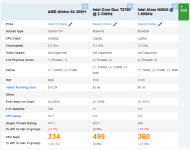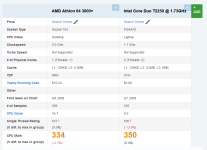That’s the only option really though if you want to avoid and confusion or gray areas.
I think that grey areas are fine, and probably inevitable anyway.
I’m aware, but it doesn’t change my point that it’s a faster chip.
I feel that that's an utterly irrelevant point. I do not think we should be categorising things by speed because there can massive differences in speed on what's essentially the same platform. People today are running CP/M on Z80 CPUs that are literally two orders of magnitude faster than early CP/M machines. That doesn't make running CP/M less retro.
32bit support is definitely dying, but you can absolutely get a usable system and run the software you need on a 32bit system.
True. That sounds like a good reason to me to entirely exclude x86 32-bit systems, though I expect there are many people who will disagree with me on that.
Am I the only one who feels all the extra sub categories serve no purpose other than adding confusion and clutter?
I don't know if you're the only one that feels that. But I do find the "extra sub categories" useful for browsing, because it works a lot better than, say, a search for "VIC-20."
Tandy is one of the more active forums. Should it be broke down into:
..
CoCo, MC-10
I feel pretty strongly that MC-10 should not go into the CoCo section. It's a completely different computer from the CoCo (not even the same CPU) and, being much less popular, is going to get lost amongst the CoCo posts. It should be put together with other less popular TRS-80 systems, such as the handhelds.
I/III/4
2/12/16/6000
MS-DOS (Tandy 2000 + Radio Shack's PC compatibles)
CoCo
Portables (this covers both Tandy's proprietary laptops and the pocket computers)
My MC-10 comments above apply, of course.
As for "Portables," I don't know about any of Tandy's proprietary laptops, but they should be mentioned explicitly since otherwise they could be confused with the Model 100 series. That, of course, should go in a Kyocera 85 section somewhere as the TRS-80 Model 100 is a rebadged 85 and the NEC PC-8201 and Olivetti M-10 are very little different. (In particular, same CPU, same core hardware and same ROMs excepting localisation).
There was a comment earlier about expecting posts for Tandy's MS-DOS machines to go into the separate PC clones bucket, but between the 2000 being a reasonably popular conversation subject that last few months and the fact that the Tandy 1000 family is both weird enough and popular enough to kind of be its own separate thing from normal XTs I'd say "MS-DOS" rates its own category under Tandy. (Although I would say this category is a lot less relevent for machines like the 1200 and the 3000-and-up families that are much more just plain PC clones.)
I have no idea how much traffic there is on the 1000 that's really distinguished from the PC clone stuff, but if it's there, that sounds reasonable to me. I'd suggest explicitly calling it "Tandy 1000," though and noting that the plain PC clone stuff should go in the PC section. (Not that I care that much; it's not a section I'll be reading.)


